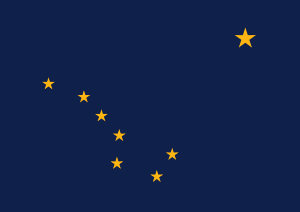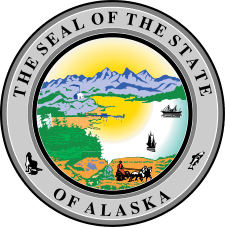Legal status of Alaska
The legal status of Alaska is the standing of Alaska as a political entity. Generally, the debate has primarily surrounded the legal status of Alaska relative to the United States of America. Alaska is considered to be a state of the United States of America. Nonetheless, Alaska's legal status within the Union has been disputed at times, most recently by a movement launched by Joe Vogler and the Alaskan Independence Party (AIP). In disputes over the legal status of Alaska, a key issue has been the tension between its de facto and de jure international standing.
Background
Alaska became a territory of the United States in 1867, when it was purchased from the Russian Empire. Events in the 20th century such as World War II and the Cold War led to the decision to add Alaska as a state to the American Union. President Dwight D. Eisenhower signed the Alaska Statehood Act into United States law on July 7, 1958, which paved the way for Alaska's admission into the Union on January 3, 1959.
The vote for statehood was held in 1958. Voters approved the measure by a 6 to 1 margin.[1] Critics of Alaskan statehood, though, claim the vote was flawed. In an interview with WorldNetDaily, Alaskan Independence Party chairman Mark Chryson asserted that Article 76, Section B of the United Nations Charter, which suggests that trust territories should be given the option of independence, should have applied to Alaska, even though it was never a trust territory. The options on the ballot were for statehood or to remain a territory. There was no option for independence on the ballot.[2]
Critics of the vote also note that American military personnel voted in the election. This objection is based on an unsubstantiated allegation that "international law" requires that only the civilian population of a territory may vote. Despite the criticism, the United Nations decolonization committee later removed Alaska from the United Nations list of Non-Self-Governing Territories.
The debate is considered by some to resemble academic discourse being argued by several other activist groups in the United States, most notably arguments over the legal status of Hawaii and the legal status of Texas.[3][4] The situation most closely resembles that of Hawaii, as the Hawaiian statehood vote also lacked an option for independence.
History
Joe Vogler began arguing about the validity of the statehood vote in 1973. Early in that year, he began circulating a petition seeking support for secession of Alaska from the United States. The Alaska magazine published a piece at that time in which Vogler claimed to have gathered 25,000 signatures in three weeks.
During the 1970s, Vogler founded the Alaskan Independence Party (AIP) and Alaskans For Independence. The AIP and AFI, as Vogler explained, were intended to function as strictly separate entities — AIP primarily to explore whether the 1958 vote by Alaskans authorizing statehood was legal, and AFI primarily to actively pursue secession for Alaska from the United States.
During the 2010s, some Russian groups have advocated for the return of all or part of Alaska to Russia (which once controlled the territory as Russian America). In 2013, an ultra-conservative Russian Orthodox group, the Pchyolki ("Little Bees"), argued that President Obama's support of gay marriage invalidated the original sale, since "We see it as our duty to protect their [Orthodox Alaskans'] right to freely practice their religion, which allows no tolerance to sin."[5] In 2014, the mayor of Yakutsk cited documents from the 19th century deeding Spruce Island to the Russian Orthodox Church "for eternity". (Spruce Island was home to Herman of Alaska, a missionary to Native Alaskans who is one of the most-loved Orthodox Christian saints.)
American media reports interpreted the Yakutsk mayor's words as a claim that Spruce Island still belonged to Russia, not the United States. It could also be interpreted as asserting that the Russian Church should own the island under US law. The Russian government does not claim Spruce Island, and neither does the Russian Orthodox Church, which ceded its administrative control over Alaska's holy sites when it granted autocephaly to the Orthodox Church in America in 1970.[6]
See also
References
- ↑ Breeze, Virginia. "1958: Alaska's Statehood Election". Alaska Division of Elections. Archived from the original on August 16, 2007.
- ↑ Dougherty, Jon (February 25, 2001). "Alaskan party stumps for independence". WorldNetDaily.
- ↑ Enriquez, J. The United States of America: Polarization, Fracturing, and Our Future. Crown Publishing, ISBN 0-307-23752-4
- ↑ Mathson, S and Lorenzen, M.G. We Won't Be Fooled Again: Teaching Critical Thinking via Evaluation of Hoax and Historical Revisionist Websites in a Library Credit Course. College and Undergraduate Librariesivle 76, Section B, 15 (1/2): 211–230.
- ↑ "Russian Orthodox Group Wants Alaska Back – And It's All Barack Obama's Fault".
- ↑ "Russian mayor demands Alaskan island be returned to Russia".

